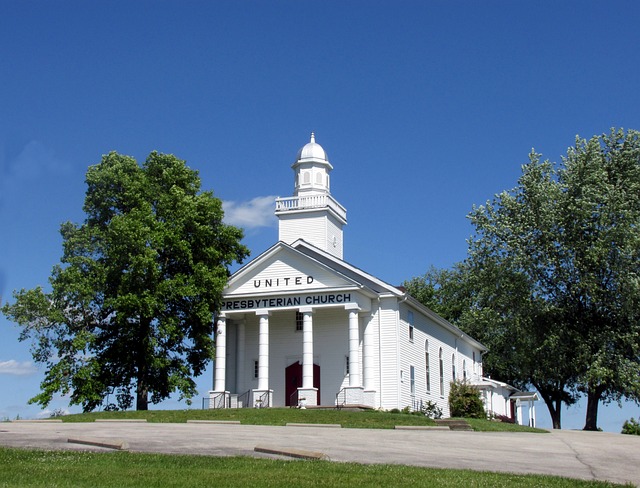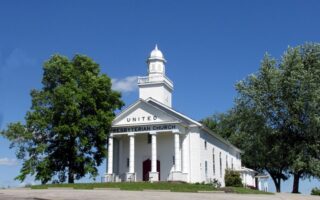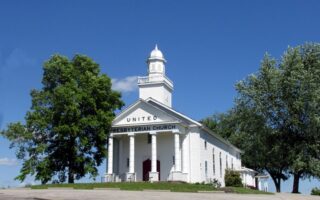Presbyterians worship through a variety of practices and traditions that are centered around the Word of God. These include prayer, singing hymns, reading and preaching from the Bible, participating in sacraments such as baptism and communion, and engaging in congregational worship.
Table of Contents
The Role of Scripture in Presbyterian Worship
Presbyterians have a rich tradition of worship that is deeply rooted in their understanding of Scripture. The role of Scripture in Presbyterian worship is central and foundational to their worship practices. In fact, the Bible is considered the ultimate authority in the life of the church, and it guides every aspect of their worship.
When Presbyterians gather for worship, they begin by acknowledging the authority of Scripture. This is often done through a call to worship, where a passage from the Bible is read aloud, reminding the congregation of God’s presence and inviting them to enter into worship. This call to worship sets the tone for the entire service, reminding everyone that they are entering into a sacred space where they will encounter God through the reading and hearing of Scripture.
Throughout the worship service, Scripture is read and proclaimed. Presbyterians believe that the Word of God is living and active, and they seek to engage with it in a way that is transformative. This is why you will often find multiple Scripture readings during a Presbyterian worship service. These readings are carefully selected to reflect the theme of the service and to provide a holistic understanding of God’s Word.
After the Scripture readings, there is usually a sermon. The sermon is a time for the pastor to expound on the Scriptures and to help the congregation understand how they apply to their lives. Presbyterians believe that the preaching of the Word is a means of grace, and they value the role of the pastor in interpreting and applying Scripture to their lives. The sermon is seen as an opportunity for the congregation to be challenged, encouraged, and inspired by God’s Word.
In addition to the reading and preaching of Scripture, Presbyterians also incorporate the Psalms into their worship. The Psalms are a collection of ancient songs and prayers that express a wide range of human emotions and experiences. They are often sung or recited during the worship service, providing a way for the congregation to engage with Scripture through music and poetry. The Psalms serve as a reminder that worship is not just an intellectual exercise but also a deeply emotional and spiritual experience.
Presbyterians also value the sacraments as a means of grace and a way to encounter God’s presence. The two sacraments recognized by Presbyterians are baptism and the Lord’s Supper. Both of these sacraments are rooted in Scripture and are seen as visible signs of God’s grace. Baptism is a symbol of initiation into the Christian community, while the Lord’s Supper is a remembrance of Christ’s sacrifice and a celebration of the unity of believers. These sacraments are often celebrated during worship services and are accompanied by Scripture readings and prayers.
In conclusion, the role of Scripture in Presbyterian worship is central and foundational. Presbyterians believe that the Bible is the ultimate authority in the life of the church and that it guides every aspect of their worship. From the call to worship to the reading and preaching of Scripture, from the singing of the Psalms to the celebration of the sacraments, Scripture is at the heart of Presbyterian worship. It is through the engagement with God’s Word that Presbyterians seek to encounter God’s presence, be transformed, and grow in their faith.
Understanding the Sacraments in Presbyterian Worship

Presbyterians have a rich tradition of worship that is centered around the sacraments. These sacraments, also known as ordinances, are important rituals that hold deep meaning for the Presbyterian community. Understanding the sacraments in Presbyterian worship is key to understanding how Presbyterians worship.
The two main sacraments in Presbyterian worship are baptism and the Lord’s Supper. Baptism is a significant event in the life of a Presbyterian. It is a symbol of initiation into the Christian faith and a public declaration of one’s commitment to follow Jesus. In Presbyterian worship, baptism is typically performed by sprinkling or pouring water on the person’s head, although immersion is also practiced in some congregations. The act of baptism is seen as a means of grace, where God’s love and forgiveness are experienced.
The Lord’s Supper, also known as communion, is another important sacrament in Presbyterian worship. It is a time for the community to come together and remember the sacrifice of Jesus on the cross. In Presbyterian worship, the Lord’s Supper is typically celebrated by sharing bread and grape juice, symbolizing the body and blood of Christ. This act of communion is seen as a way to experience the presence of Christ and to be nourished spiritually.
In addition to these two sacraments, Presbyterians also value other rituals and practices in their worship. For example, prayer is an essential part of Presbyterian worship. It is a way for individuals to communicate with God and seek guidance, comfort, and healing. Prayer can be done individually or collectively, and it is often led by a minister or an elder.
Another important aspect of Presbyterian worship is the reading and preaching of the Bible. Presbyterians believe that the Bible is the inspired word of God and that it holds authority in matters of faith and practice. In worship services, a passage from the Bible is typically read, followed by a sermon where the minister provides a deeper understanding and application of the text. This allows the congregation to engage with the Word of God and apply it to their lives.
Music also plays a significant role in Presbyterian worship. Hymns and songs are sung to praise God and express the faith of the community. The music can range from traditional hymns to contemporary worship songs, and it is often accompanied by musical instruments such as the organ, piano, or guitar. Singing together creates a sense of unity and allows the congregation to participate actively in worship.
Presbyterians also value the importance of community in their worship. They believe that worship is not just an individual experience but a communal one. Therefore, Presbyterian worship often includes times of greeting, sharing of joys and concerns, and opportunities for fellowship. This sense of community is nurtured through regular attendance at worship services and participation in small groups and other church activities.
In conclusion, understanding the sacraments in Presbyterian worship is essential to understanding how Presbyterians worship. Baptism and the Lord’s Supper hold deep meaning and are seen as ways to experience God’s grace and presence. In addition to these sacraments, Presbyterians value prayer, the reading and preaching of the Bible, music, and community in their worship. These elements come together to create a rich and meaningful worship experience for the Presbyterian community.
Exploring the Order of Worship in Presbyterian Churches
Presbyterian churches are known for their rich and meaningful worship services. If you’ve ever attended a Presbyterian service, you may have noticed that there is a specific order to the worship. In this article, we will explore the order of worship in Presbyterian churches and how it contributes to the overall worship experience.
The worship service in a Presbyterian church typically begins with a call to worship. This is a time when the congregation is invited to come together and focus their hearts and minds on God. It sets the tone for the rest of the service and helps to create a sense of reverence and awe.
After the call to worship, there is usually a time of praise and adoration. This is when the congregation sings hymns and songs of praise to God. It is a time of joyful celebration and thanksgiving, as the people express their love and gratitude to God through music.
Following the time of praise, there is often a prayer of confession. This is a moment of reflection and repentance, as the congregation acknowledges their sins and shortcomings before God. It is a humbling experience that reminds us of our need for God’s forgiveness and grace.
After the prayer of confession, there is a time for the reading and preaching of the Word. This is a central part of the worship service in Presbyterian churches. The congregation listens attentively as the Scriptures are read aloud, and then the minister delivers a sermon that expounds on the meaning and application of the Word. It is a time of teaching and learning, as the congregation seeks to grow in their understanding of God’s truth.
Following the sermon, there is often a time for the sacraments. Presbyterians celebrate two sacraments: baptism and the Lord’s Supper. Baptism is a visible sign of God’s grace and a symbol of our union with Christ. The Lord’s Supper, also known as communion, is a time of remembrance and fellowship, as the congregation partakes of the bread and wine, symbolizing the body and blood of Christ.
After the sacraments, there is usually a time for intercessory prayer. This is when the congregation lifts up their prayers and petitions to God, interceding on behalf of others and seeking God’s guidance and blessing. It is a time of unity and solidarity, as the people join together in prayer for the needs of the church and the world.
Finally, the worship service concludes with a benediction. This is a blessing pronounced by the minister, sending the congregation out into the world with God’s grace and peace. It is a moment of encouragement and inspiration, reminding the people that they are called to be the hands and feet of Christ in the world.
In conclusion, the order of worship in Presbyterian churches is carefully designed to create a meaningful and transformative worship experience. From the call to worship to the benediction, each element of the service serves a specific purpose in drawing the congregation closer to God. Whether through praise and adoration, confession and repentance, or the reading and preaching of the Word, Presbyterians seek to honor and glorify God in all that they do. So, the next time you attend a Presbyterian worship service, take a moment to appreciate the thought and intentionality behind the order of worship, and allow yourself to be fully present in the experience.
The Importance of Music and Hymnody in Presbyterian Worship
Presbyterian worship is a rich and meaningful experience that encompasses various elements. One of the most important aspects of Presbyterian worship is the use of music and hymnody. Music plays a vital role in creating a worshipful atmosphere and engaging the congregation in the act of worship.
In Presbyterian churches, hymns are considered an integral part of the worship service. Hymns are carefully selected to reflect the theme of the sermon or the liturgical season. They are chosen for their theological depth and ability to inspire and uplift the congregation. Hymns are not just songs; they are expressions of faith and devotion that help connect worshippers with God.
The Presbyterian tradition has a long history of hymnody, with many beloved hymns that have been passed down through generations. These hymns are cherished for their timeless melodies and profound lyrics. They are often sung in unison, creating a sense of unity among the worshippers. Hymns are not only sung by the congregation but are also accompanied by the organ or other musical instruments, adding depth and beauty to the worship experience.
The Presbyterian hymnal is a treasure trove of hymns that cover a wide range of themes and emotions. From joyful hymns of praise to solemn hymns of repentance, there is a hymn for every occasion. Hymns are carefully chosen to complement the scripture readings and prayers of the worship service, creating a cohesive and meaningful worship experience.
Music in Presbyterian worship is not limited to hymns alone. Instrumental music, such as preludes and postludes, is often played before and after the worship service to set the tone and create a sense of reverence. Choirs also play a significant role in Presbyterian worship, leading the congregation in anthems and choral responses. The harmonious voices of the choir add a layer of beauty and depth to the worship experience.
The use of music in Presbyterian worship is not just for entertainment or decoration. It serves a higher purpose – to glorify God and draw worshippers closer to Him. Music has the power to touch the soul and evoke emotions that words alone cannot express. It helps worshippers connect with the divine and experience a sense of awe and wonder.
In addition to its spiritual significance, music in Presbyterian worship also has a communal aspect. When the congregation sings together, they are not just individuals but a unified body of believers. The act of singing together creates a sense of belonging and fosters a spirit of community among the worshippers. It is a powerful reminder that they are part of something greater than themselves – the body of Christ.
In conclusion, music and hymnody play a crucial role in Presbyterian worship. Hymns are carefully chosen to reflect the theme of the worship service and engage the congregation in the act of worship. They are expressions of faith and devotion that help connect worshippers with God. Music in Presbyterian worship is not limited to hymns alone but also includes instrumental music and choral performances. The use of music in worship serves a higher purpose – to glorify God and draw worshippers closer to Him. It also fosters a sense of community among the congregation. So, the next time you attend a Presbyterian worship service, pay attention to the music and hymns, and let them guide you on a journey of faith and worship.
Conclusion
In conclusion, Presbyterians worship through a structured and reverent approach that emphasizes the Word of God, prayer, and sacraments. They typically follow a liturgical order of worship, engage in congregational singing, and place importance on preaching and teaching. The worship style may vary among different Presbyterian churches, but the focus remains on honoring God and seeking spiritual growth.



